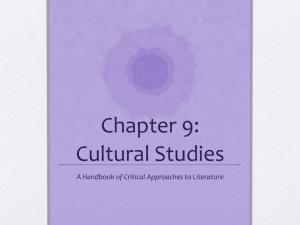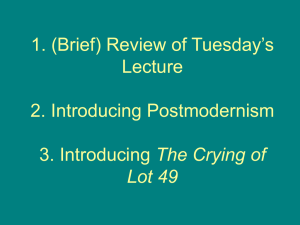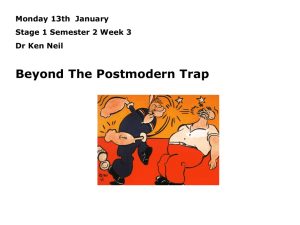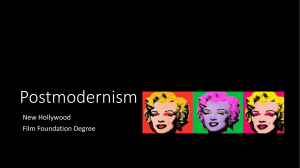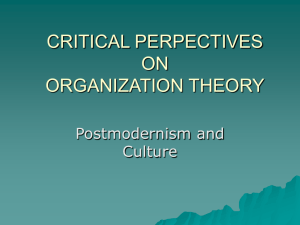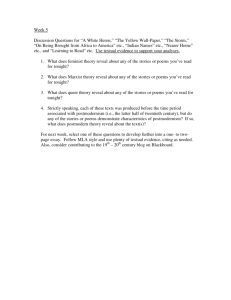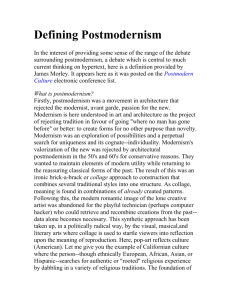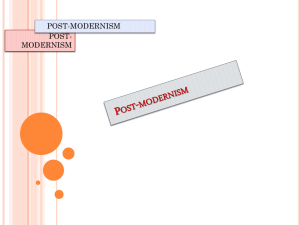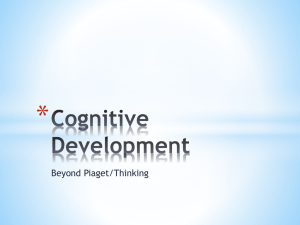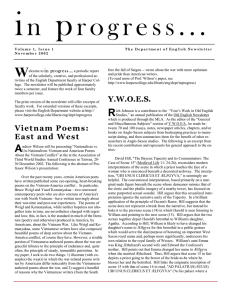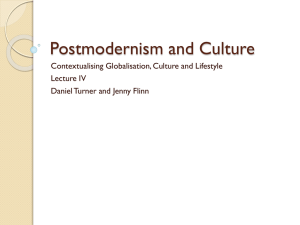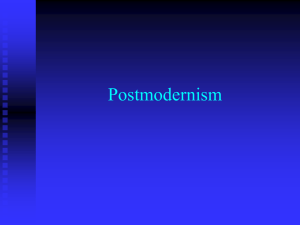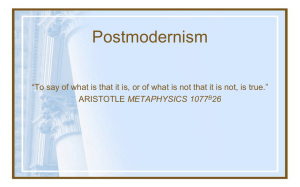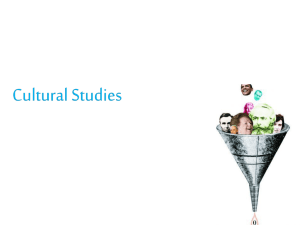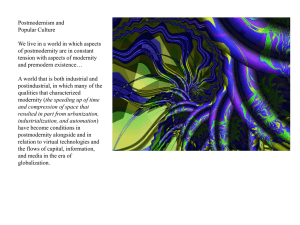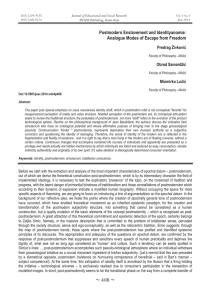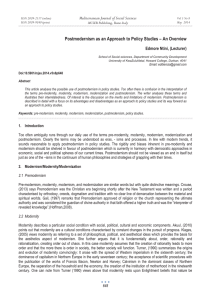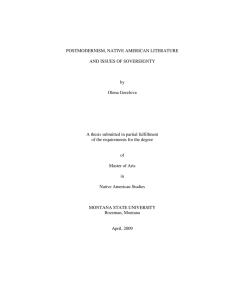The Modern and Postmodern Periods
advertisement
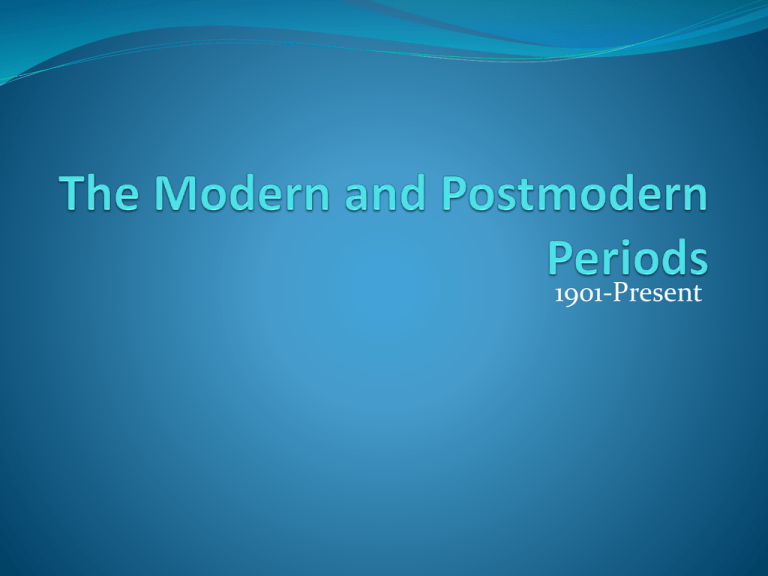
1901-Present Definitions First, it is worth acknowledging that there is considerable debate over which literary works the terms “modern” and “postmodern” should apply to, or even what exactly those terms mean. It is possible, however, to provide the most commonly accepted definitions of “modern” and “postmodern” so that you can begin to understand and use these terms on your own. Modern Literature The term “modern literature” is most frequently applied to the novels, poems, and dramas of the earlyto-mid 20th century. This is the literature written immediately before, during, and following the first and second world wars. Modern Literature Modern writers’ work was often highly charged by the politics of global expansionism, mass industrialization, and both the positive and negative aspects of modern technology. It also tends to be less realistic than literature of the Victorian Period. Instead, many modern writers used symbolism and imagery to explore, and often to try to explain, their world. Disillusionment One of the key themes of many modern literary works is “disillusionment,” particularly in the works written following World War I (1914-1918). Sometimes referred to as the “the lost generation,” writers of the 20’s and 30’s explored the gap between the early promise of technological and social advancement (i.e.– Utopia) and the harsh realities of modern life (i.e.—world wars, mass death, etc.) The cynicism of the lost generation was, for many, validated by the horrors of World War II (1939-1945), which included the holocaust, air bombings that decimated London, Dresden, and Tokyo, and the eventual atomic bombings of Hiroshima and Nagasaki. Losses and Gains The modern period saw an end to British Imperial dominance. Losses in the early part of the 20th century included: Irish independence from Britain Colonial rebellions in Asia and Africa The destruction of London by the “Blitzkrieg” In perhaps its most important victory, however, the British, under the leadership of Prime Minister Winston Churchill, and along with allies like the United States, were able to defeat Germany, Japan, and Italy in World War II. Emerging Media The advent of motion pictures and radio in the late 1800’s, and television in the mid 1900’s, had an immediate impact on all types of literature. Many “literary” artists, who considered their work more important than pop-art, continued to eschew realism and verisimilitude for more symbolic, representational forms. Realistic vs. Abstract Art Just as these two portraits demonstrate the difference between the realistic and the abstract, so many written works can be said to either embrace a realistic, or a more symbolic depiction of life. Woman with a Pearl by Jean Baptiste Camille Corot Dora Maar au Chat by Pablo Picasso Postmodernism If modernism was a literary movement that pursued explanations, postmodernism is a movement that rejects the entire notion that explanations are possible. Modernism: why do we suffer? Postmodernism: what’s the point of asking? Postmodernism exists as response to modernism, often parodying or satirizing the principal characteristics of modern literature. Postmodernism Many postmodern works rely heavily on the reader’s familiarity with the conventions of modern literature, because their originality stems from the artists’ willingness to turn convention on its ear. Some conventions altered or even totally ignored by postmodernists include: The need for a coherent and logical plot The need for a single, reliable narrative voice More Characteristics of Postmodernism Illogical or nonsensical leaps in time and place The mixing of various genres Black humor Self-referential humor The Dividing Line Some critics argue that postmodernism starts as early as the 20’s, but there is little doubt that by the late 50’s and early 60’s, many writers were working in the postmodern style. Contemporary Literature: Where Are We Now? As we move closer to our own time, it is difficult to say what literature will survive and continue to be read in the future, and what will be forgotten. In the future, what books of our era will be considered the most important and influential? Will it be the work of popular writers, like Stephen King and J.K. Rowling? Or the work of some little known author, unappreciated in his/her own lifetime, but discovered by future generations? One Thing is Certain: There are some writers of the last 100 years that are, at least at present, considered masters of language, and whose work is widely regarded as the best of the modern era. William Butler Yeats (1865-1939) The author of haunting symbolic poems like “The Second Coming,” and “Sailing to Byzantium.” T.S. Eliot (1888-1965) The most famous English poet of the early 20th century, he is best known for his bleak, despairing world view in poems like “Preludes,” “The Hollow Men,” and “The Waste Lands.” George Orwell (1903-1950) A political novelist (real name: Erik Blair) best known for coining the phrase “big brother” when describing the oppressive, totalitarian government in his most famous work, Nineteen Eighty-Four, and for attacking the oppressive communist government of Russia years before the outbreak of the cold war in Animal Farm. Virginia Woolf (1882-1941) A writer whose “stream of consciousness” novels (in which the narrative shifts and turns, often at random, with the shifting thoughts of the protagonist) such as Mrs. Dalloway and To the Lighthouse are a precursor to experimental postmodernism. Other Notables Include Joseph Conrad (Heart of Darkness) James Joyce (Ulysses and Portrait of the Artist as a Young Man) D.H. Lawrence (“The Rocking Horse Winner”) Graham Greene (“A Shocking Incident”) William Golding (Lord of the Flies) The British Tradition From the earliest poems, like Beowulf and The Canterbury Tales, to the most recent popular novel series like The Lord of the Rings, The Chronicles of Narnia, and Harry Potter, British literature continues to be among the finest produced around the globe.
